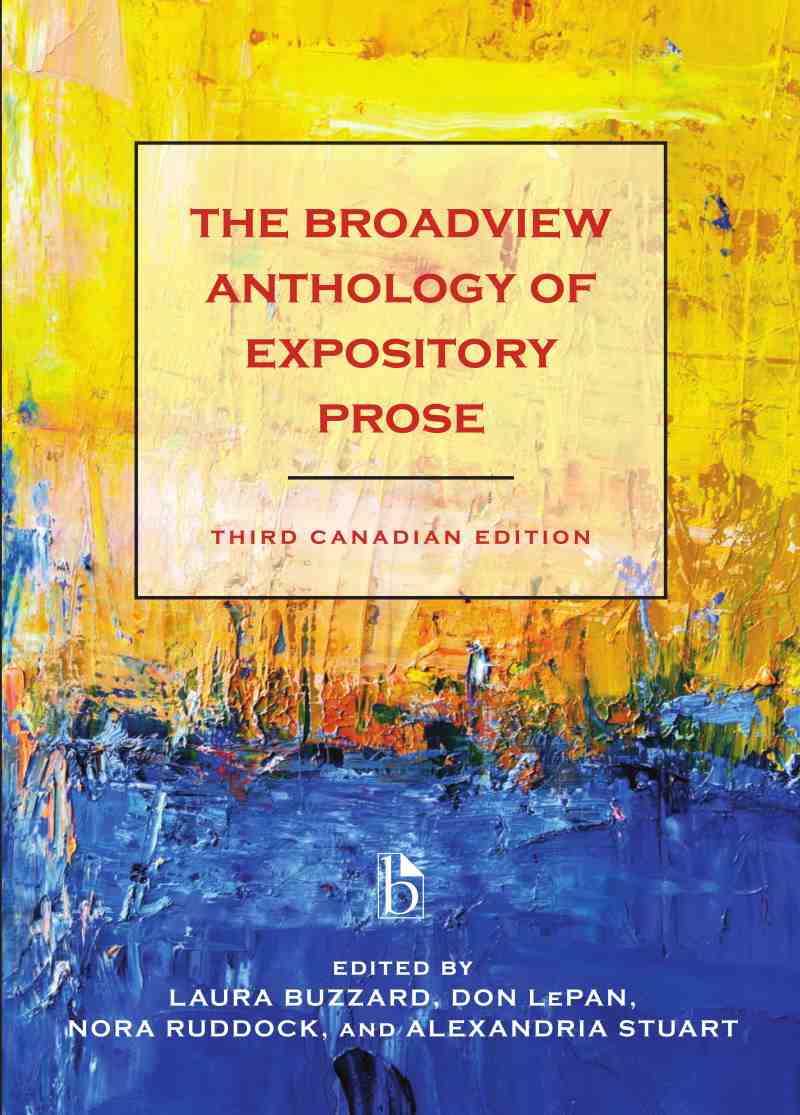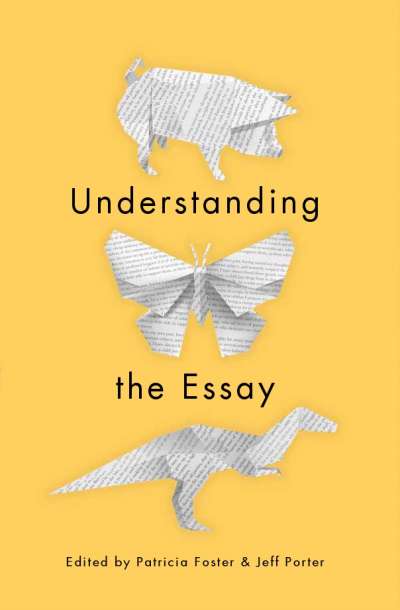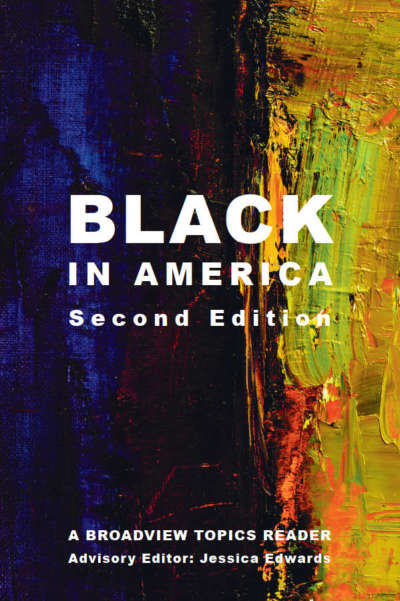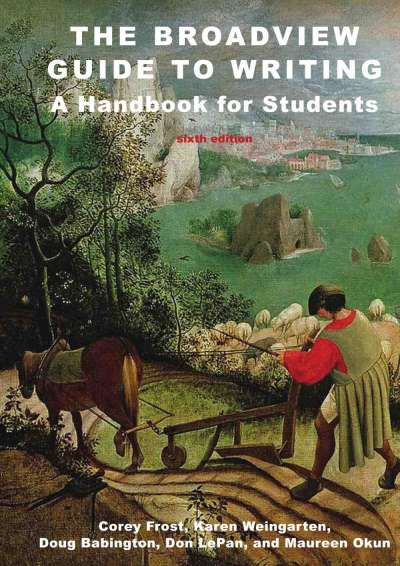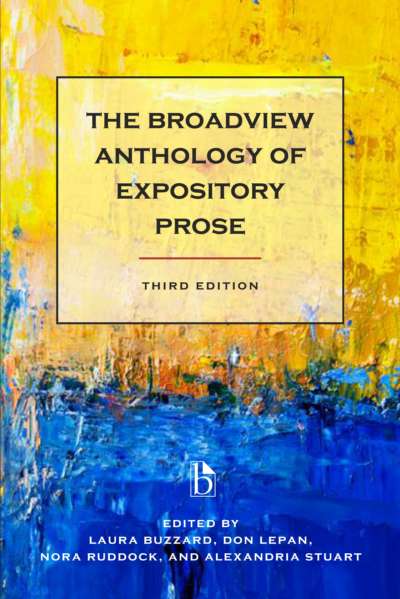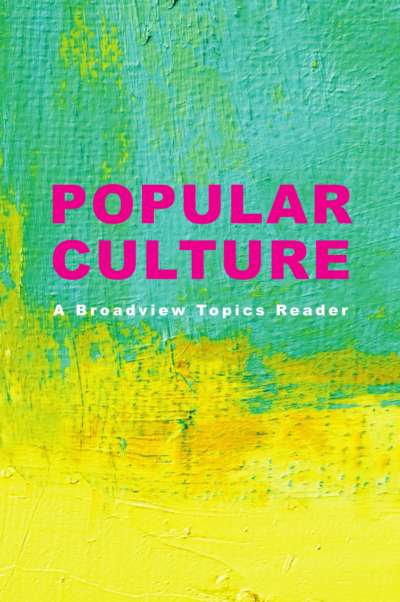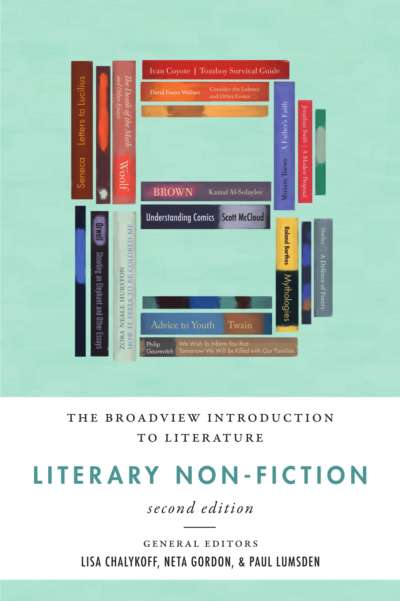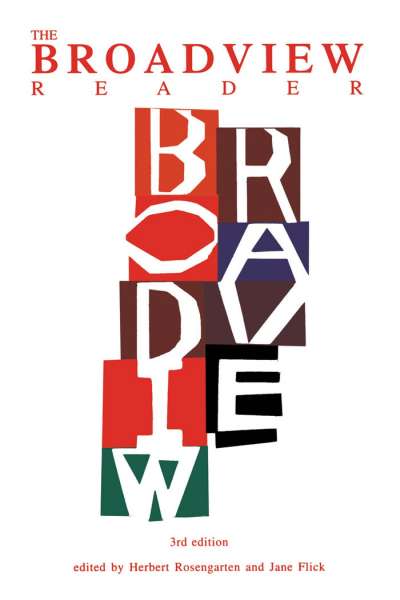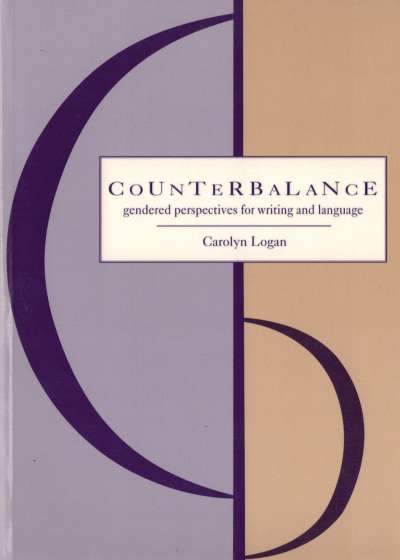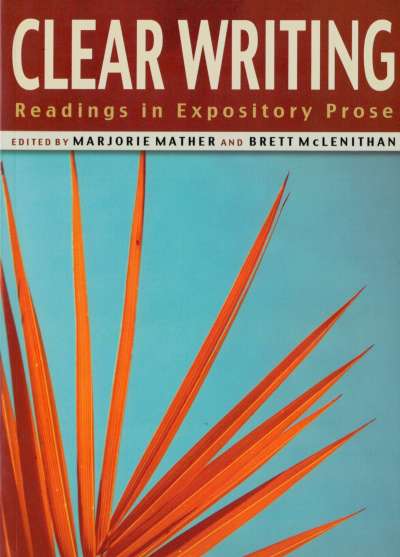The third Canadian edition of this anthology has been substantially revised and updated for a contemporary audience; a selection of classic essays from earlier eras has been retained, but the emphasis is very much on twenty-first-century expository writing. There is also a focus on issues of great importance in twenty-first-century Canada, such as climate change, the Truth and Reconciliation Commission, the Jian Ghomeshi trial, Facebook, police discrimination, trans rights, and postsecondary education in the humanities. Works of different lengths and levels of difficulty are represented, as are narrative, descriptive and persuasive essays—and, new to this edition, lyric essays.
For the new edition there are also considerably more short pieces than ever before; a number of op-ed pieces are included, as are pieces from blogs and from online news sources. The representation of academic writing from several disciplines has been increased—and in some cases the anthology also includes news reports presenting the results of academic research to a general audience. Also new to this edition are essays from a wide range of the most celebrated prose writers of the modern era—from Susan Sontag, Eula Biss, and Michel Foucault to Anne Carson and Ta-Nehisi Coates. The anthology also offers increased diversity of representation—including, for example, a larger proportion of First Nations writers and women writers than previous Canadian editions.
Unobtrusive explanatory notes appear at the bottom of the page, and each selection is preceded by a headnote that provides students with information regarding the context in which the piece was written. Each reading is also followed by questions for discussion. A unique feature is the inclusion of a set of additional notes on the anthology’s companion website—notes designed to be of particular help to EAL students and/or students who have little familiarity with Canadian culture.
The anthology is accompanied by two companion websites. The student website features additional readings and interactive writing exercises (as well as the additional notes). The instructor website provides additional discussion questions and, for a number of the anthology selections, background information that may be of interest.
Please note that this edition is particularly well suited to the needs of Canadian students; for US courses, please see The Broadview Anthology of Expository Prose – Third Edition.
Comments
“The third edition of The Broadview Anthology of Expository Prose is even more relevant than ever. This wide-ranging compilation of articles can help students navigate the troubled waters of politics, race, and gender issues. Of particular note is the thematic Aboriginal North Americans section, which includes a piece on Canada’s Truth and Reconciliation Commission. This anthology will challenge students to make connections among the diverse selections, opening new channels of classroom debate and written response.” —Laurie Cooper, Université de Moncton
“This new edition of an already excellent teaching text has doubled in size and expanded its website offerings, making it doubly indispensable. First- and second-year university students will continue to benefit from encountering classics old and new, but coverage has expanded to include not only more texts fundamental to the Canadian story, but also a global array of voices addressing timely issues, from mental health, gender identity, human-animal relations, and climate change to reconciliation, racialized inequality, the effects of social media, and political systems under stress. The Broadview Anthology of Expository Prose presents the essay as language at its most engaging, provocative, and inspiring.” —Betty A. Schellenberg, Simon Fraser University
“An impressive collection. The Broadview Anthology of Expository Prose is sure to spark stimulating class discussions on a wide range of contemporary issues and help students improve their critical thinking, reading, and writing skills.” —Farah Moosa, Vancouver Island University
Comments on Previous Edition
“What a wonderful and insightful collection of essays. My writing courses improved by leaps and bounds when I adopted the first edition.”—Beth Staley, West Virginia University
“Broadview has surpassed itself. This eclectic anthology represents the essay as a supple form of expression, and its subject as all that pertains to the human condition. Invaluable for the classroom, this collection will also challenge, amuse, provoke, and console the general reader.”—Susanna Egan, University of British Columbia
“My students’ responses to the readings have sparked meaningful and productive conversations about culture, education, and our ways of viewing the world. To my delight, at the end of a typical meeting we are left with even more questions than when we began. This text fosters students’ growth as inquisitive, critical readers and opens the doorway to future academic work.”—Alixandra V. Krzemien, Canisius College
“Articles such as Binyavanga Wainaina’s ‘How to Write about Africa’ and Malcolm Gladwell’s ‘None of the Above: What I.Q. Doesn’t Tell You About Race’ provide material that is both current and controversial, making it perfect for class discussions focused on the critical expression of relevant issues. The [editors offer] insightful questions at the end of each article and have chosen readings carefully—[this is an anthology] … that can be used beneficially in class discussion and as the basis for written assignments.”—Louise Nichols, Université de Moncton
“The Broadview Anthology of Expository Prose is one of the best essay anthologies I have seen. The remarkable diversity of the essays covers an impressive range of authors, styles, topics, and viewpoints.”—Paul D. Farkas, Metropolitan State College
PREFACE
CONTENTS BY SUBJECT
CONTENTS BY RHETORICAL CATEGORY AND MEDIUM
LUCRETIUS
LUCIUS ANNAEUS SENECA
MICHEL DE MONTAIGNE
FRANCIS BACON
JOHN DONNE
MARGARET CAVENDISH
from Sociable Letters [On Social Class and Happiness]
SAMUEL JOHNSON
LADY MARY WORTLEY MONTAGU
JONATHAN SWIFT
MARY WOLLSTONECRAFT
Dedication to A Vindication of the Rights of Woman
HARRIET MARTINEAU
from A Retrospect of Western Travel
ELIZABETH CADY STANTON
Seneca Falls Keynote Address
HENRY DAVID THOREAU
FREDERICK DOUGLASS
from Fourth of July Oration
MARY ANN SHADD
from Relations of Canada to American Slavery
JOHN A. MACDONALD
from Speech Delivered on 6 February 1865 [On Confederation]
CHARLES DARWIN
from On the Origin of Species by Means of Natural Selection
ELIZA M.
MARK TWAIN
LADY AGNES MACDONALD
OSCAR WILDE
SIR WILFRID LAURIER
from Speech Delivered on 14 October 1904 [“The Twentieth Century Shall Be the Century of Canada”]
W.E.B. DU BOIS
ZORA NEALE HURSTON
How It Feels to Be Coloured Me
JANET FLANNER
VIRGINIA WOOLF
GEORGE ORWELL
Shooting an Elephant
Politics and the English Language
HANNAH ARENDT
from The Origins of Totalitarianism
JAMES BALDWIN
TOMMY DOUGLAS
Medicare: The Time to Take a Stand
STANLEY MILGRAM
from Behavioral Study of Obedience
RAYMOND WILLIAMS
MARTIN LUTHER KING JR.
Letter from Birmingham Jail
NELSON MANDELA
from An Ideal for Which I Am Prepared to Die
ROLAND BARTHES
from Mythologies
Soap-Powder and Detergents
Toys
JOHN BERGER
MARVIN HARRIS
from Pig Lovers and Pig Haters
MICHEL FOUCAULT
The Perverse Implantation [from The History of Sexuality]
PETER SINGER
LESLIE MARMON SILKO
AUDRE LORDE
Poetry Is Not a Luxury
The Uses of Anger: Women Responding to Racism
ADRIENNE RICH
ELAINE SHOWALTER
Representing Ophelia: Women, Madness, and the Responsibilities of Feminist Criticism
NGŪGĨ WA THIONG’O
from Decolonizing the Mind
SALMAN RUSHDIE
DREW HAYDEN TAYLOR
Pretty Like a White Boy: The Adventures of a Blue-Eyed Ojibway
SHERMAN ALEXIE
ANNE CARSON
from Short Talks
Introduction
On Parmenides
On Sleep Stones
On Walking Backwards
On the Total Collection
On Sunday Dinner with Father
EMILY MARTIN
The Egg and the Sperm: How Science Has Constructed a Romance Based on Stereotypical Male-Female Roles
JAMAICA KINCAID
On Seeing England for the First Time
DAVID CARD AND ALAN B. KRUEGER
from Minimum Wages and Employment: A Case Study of the Fast-Food Industry in New Jersey and Pennsylvania
URSULA FRANKLIN
Silence and the Notion of the Commons
BELL HOOKS
Coming to Class Consciousness [from Where We Stand]
ALICE BECK KEHOE
JUDITH RICH HARRIS
RICHARD RODRIGUEZ
from Crossing Borders [San Diego and Tijuana]
THOMAS HURKA
PHILIP GOUREVITCH
from We Wish to Inform You That Tomorrow We Will Be Killed with Our Families
LARISSA LAI
Political Animals and the Body of History
WITOLD RYBCZYNSKI
TIM DEVLIN
MARGARET ATWOOD
MIRIAM TOEWS
SUSAN SONTAG
from Regarding the Pain of Others
MARK BEEMAN, ET AL.
DAVID FOSTER WALLACE
JAN WONG
BINYAVANGA WAINAINA
How to Write about Africa
MALCOLM GLADWELL
None of the Above: What I.Q. Doesn’t Tell You about Race
FABRIZIO BENEDETTI, ANTONELLA POLLO, AND LUANA COLLOCA
Opioid-Mediated Placebo Responses Boost Pain Endurance and Physical Performance: Is It Doping in Sport Competitions?
DANIEL HEATH JUSTICE
Fear of a Changeling Moon
EULA BISS
Time and Distance Overcome
MARILYN WANN
from Fat Studies: An Invitation to Revolution
AI WEIWEI
LUIS W. ALVAREZ, WALTER ALVAREZ, FRANK ASARO, AND HELEN V. MICHEL
ELIZABETH KOLBERT
IRENE PEPPERBERG, JENNIFER VICINAY, AND PATRICK CAVANAUGH
IRENE PEPPERBERG
from Alex & Me:: How a Scientist and a Parrot Uncovered a Hidden World of Animal Intelligence—and Formed a Deep Bond in the Process
MARINA KEEGAN
JONATHAN SAFRAN FOER
JEANETTE ARMSTRONG
En’owkin: What It Means to a Sustainable Community
NEAL MCLEOD
KRISTEN GILCHRIST
from Newsworthy Victims? Exploring Differences in Canadian Press Coverage of Missing/Murdered Aboriginal and White Women
MICHAEL HARRIS
RYKA AOKI
J WALLACE
The Manly Art of Pregnancy
ZADIE SMITH
EDEN ROBINSON
from The Sasquatch at Home: Traditional Protocols and Storytelling
AMY SCHALET
from Not Under My Roof: Parents, Teens, and the Culture of Sex
IAN NICHOLSON
from “Torture at Yale”: Experimental Subjects, Laboratory Torment and the “Rehabilitation” of Milgram’s “Obedience to Authority”
PICO IYER
ETHAN KROSS, ET AL.
from Facebook Use Predicts Declines in Subjective Well-Being in Young Adults
NADINE BACHAN
CARL WILSON
I Knew About Jian Ghomeshi
JESSAMYN HOPE
IRA BOUDWAY
NBA Refs Learned They Were Racist, and That Made Them Less Racist
REBECCA SOLNIT
Climate Change Is Violence
The Mother of All Questions
CLAUDIA RANKINE
from Citizen: An American Lyric [On Serena Williams]
NIKOLE HANNAH-JONES
How School Segregation Divides Ferguson—and the United States
TA-NEHISI COATES
NICHOLAS KRISTOF
When Whites Just Don’t Get It
When Whites Just Don’t Get It, Part 6
LAWRENCE G. PROULX
A Group You Can Safely Attack
ROXANE GAY
NOURIEL ROUBINI
Economic Insecurity and the Rise of Nationalism
SARAH DE LEEUW
MARGO PFEIFF
When the Vikings Were in Nunavut
JAMES SUROWIECKI
JONATHAN M. METZL AND KENNETH T. MACLEISH
from Mental Illness, Mass Shootings, and the Politics of American Firearms
NATHANAEL JOHNSON
Is There a Moral Case for Meat?
MICHAEL POLLAN
Why “Natural” Doesn’t Mean Anything Anymore
LAILA LALAMI
My Life as a Muslim in the West’s “Gray Zone”
SARAH KURCHAK
Autistic People Are Not Tragedies
EMILY NUSSBAUM
The Price Is Right: What Advertising Does to TV
RACHEL MORAN
Buying Sex Should Not Be Legal
DESMOND COLE
CARISSA HALTON
from A Different Kind of Simakanis
MARGARET MACMILLAN
from History’s People: Personalities and the Past [Victor Klemperer]
TRUTH AND RECONCILIATION COMMISSION OF CANADA
from Honouring the Truth, Reconciling for the Future: Summary of the Final Report of the Truth and Reconciliation Commission of Canada
BARTON SWAIM
How Trump’s Language Works for Him
ANDREW COYNE
Guarantee a Minimum Income, not a Minimum Wage
ANONYMOUS [THE TORONTO STAR]
Basic Income is Tempting, but It Could Backfire
ALEX BOZIKOVIC
Chicago Architect Aims to Repair Relations between Police, Residents
GLORIA GALLOWAY
Dr. Bjorn Lomborg Argues the Climate Change Fight Isn’t Worth the Cost
JONATHAN KAY
How Political Correctness is Hurting the Poor
MALIK JALAL
I’m on the Kill List. This Is What It Feels Like to Be Hunted by Drones
ROSS FINNIE, KAVEH AFSHAR, EDA BOZKURT, MASASHI MIYAIRI, AND DEJAN PAVLIC
from Barista or Better? New Evidence on the Earnings of Post-Secondary Education Graduates: A Tax Linkage Approach
BARRIE MCKENNA
It’s Time to Retire the Myth of the Educated Barista
NATHAN HELLER
The Failure of Facebook Democracy
DOUG SAUNDERS
Don’t Blame Dark Voting Trends on Online Thought Bubbles
RON SRIGLEY
DARRYL WHETTER
GEOFFREY YORK
Could a Legal Horn “Harvest” and Trade Save the Rhino?
NAOMI KLEIN
CHARLOTTE MCDONALD-GIBSON
The Human Face of the Refugee Crisis
ADAM GOPNIK
Does Mein Kampf Remain a Dangerous Book?
JUSTICE WILLIAM B. HORKINS
from The Ghomeshi Verdict
KATIE TOTH
After Not Guilty: On Sexual Assault and the Carceral State
ANONYMOUS [THE ECONOMIST]
from Pocket World in Figures 2016
MARY ROGAN
from Growing Up Trans: When Do Children Know Their True Gender?
JACQUELINE ROSE
from Who Do You Think You Are?
DENISE BALKISSON
Migrant Farm Workers Deserve Better from Canada
JUSTIN TRUDEAU
BARACK OBAMA
CATHAL KELLY
Tim Raines Is a Poster Boy for Sports Injustice, But His Snub Doesn’t Deserve Our Obsession
JOSÉ LUIS PARDO VEIRAS
A Decade of Failure in the War on Drugs
TRAVIS LUPICK
TIMOTHY D. SNYDER
Twenty Lessons from the Twentieth Century
DAVID FRUM
from How to Build an Autocracy
SUE DONALDSON AND WILL KYMLICKA
Born Allies: Child and Animal Citizens
BIOGRAPHICAL NOTES
ACKNOWLEDGMENTS
INDEX
Laura Buzzard and Don LePan are co-authors of The Broadview Pocket Glossary of Literary Terms (2014) and of How to Be Good with Words (forthcoming, 2017); Nora Ruddock and Alexandria Stuart are, respectively, Developmental Editor and Assistant Editor, at Broadview Press.
An Instructor Site hosts an instructor’s guide composed, for the most part, of questions for discussion beyond those provided on the student website.
A Student Site hosts additional readings as well as notes that may be of use to students learning English as an additional language, students who are new to Canada, and any other students who would benefit from further annotation than that provided in the bound book. The site also includes writing exercises; links to websites providing reliable information on spelling, grammar, and style; and sample student and scholarly essays in MLA, APA, and Chicago styles.

